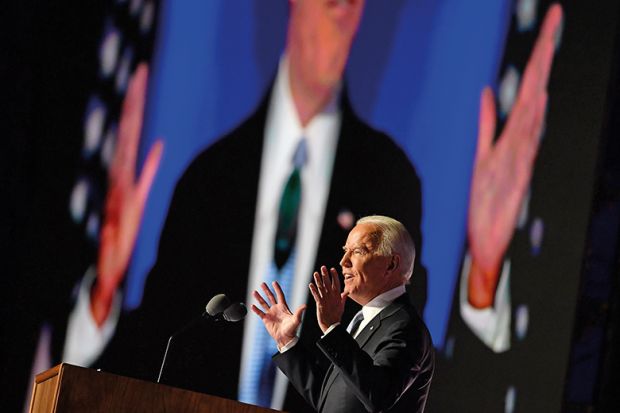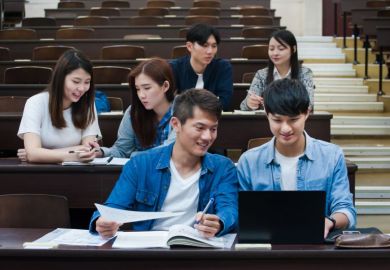Joe Biden faces an uphill struggle to regain the US’ pre-eminence in the international student recruitment race, according to experts who claimed that the president-elect will find it difficult to shift perceptions even if he enacts policy change.
Policy experts in the US predicted that the Biden administration would reverse Donald Trump’s immigration-related executive orders, but that it would be almost impossible for the new government to create a more competitive post-study work route unless it can take control of the Senate. The balance of power is unlikely to be known until Georgia holds run-off elections for both of its seats in January.
Meanwhile, the long-running attacks on foreigners and immigrants by the Trump administration mean the nation will have to work hard to restore trust among prospective overseas students, they said.
Mr Biden has already pledged to end the travel ban on arrivals from several Muslim-majority countries on his first day in office and it was thought that he was likely to overturn policies that limit the duration of stay for international students, narrow the eligibility for H-1B skilled worker visas – a common route international graduates use to stay in the US and work – and prevent new international students from taking an entirely online course of study.
“The good news is that overnight Biden can and will make the US more attractive to international students,” said Doug Rand, a senior fellow at the Federation of American Scientists who worked on immigration policy under the Obama administration. “The bad news is Trump has done such deep damage to America’s reputation as a top destination for international students that we may never get back to par.”
The US remains the most popular destination for international students globally, attracting nearly 1 million foreign learners annually, according to latest data from the United Nations Educational, Scientific and Cultural Organisation. However, it has recorded consecutive declines in overseas enrolment under the Trump administration, with preliminary figures for this term from the National Student Clearinghouse Research Center indicating a 14 per cent slump in new starters. Early survey data from the Institute of International Education indicated a 0.9 per cent decline in 2019, following a 6.6 per cent fall the year before.
Mr Rand, who is co-founder of Boundless Immigration, a technology company that helps immigrants obtain green cards and citizenship, added: “I put myself in the shoes of a talented student anywhere in the world thinking: ‘I want to get the best education the world has to offer.’ Pre-Trump, I would have certainly put the US as number one, but now I realise that every four years the US could go right back to an anti-immigrant president. That’s something new.”
Gerardo Blanco, associate director of the Center for International Higher Education at Boston College, said that “there has been a change in the perception of the US that goes beyond who is president”.
Meanwhile, “immigration reform more fundamentally – the kind of thing that would really change the game about how international students see the US in comparison to Canada or Australia, which have more friendly policies for international graduates to stay and work – would require [support in] the Senate and I don’t think that’s going to be attainable”, he said.
Brad Farnsworth, vice-president for global engagement at the American Council on Education, predicted that the US would see an increase in international student enrolment as a result of the election result, adding that “if I were in Ottawa, London or Canberra, I would say the US is back in business and we can’t stand still”.
However, he agreed that reversing the executive orders was “not going to be enough”.
“It’s easy to lose sight of the fact that the demand was already softening for the US market” before Mr Trump was elected, largely owing to global competition, he said.
Roopa Desai Trilokekar, associate professor in the Faculty of Education at Canada’s York University, predicted that the Democratic victory would slow Canada’s growth in international student numbers, but the country would continue to see a rise in overseas recruitment thanks to its welcoming immigration policies.
“I don’t think we’ll see a big dip but, in the long run, should the Biden government start changing policies we will see some shift,” she said.
Meanwhile, Gwilym Croucher, senior lecturer in higher education policy and management at the University of Melbourne, said that “geopolitical tensions between Australia and China present a thornier problem” for international student recruitment “than any change in perceptions about the US following a Biden win”.
The challenge of when and how borders open to overseas students during the pandemic may also “end up being more important for the fortunes of Australian international education than any rhetorical change in the US coming from the election of Joe Biden”, he added.
Register to continue
Why register?
- Registration is free and only takes a moment
- Once registered, you can read 3 articles a month
- Sign up for our newsletter
Subscribe
Or subscribe for unlimited access to:
- Unlimited access to news, views, insights & reviews
- Digital editions
- Digital access to THE’s university and college rankings analysis
Already registered or a current subscriber? Login








